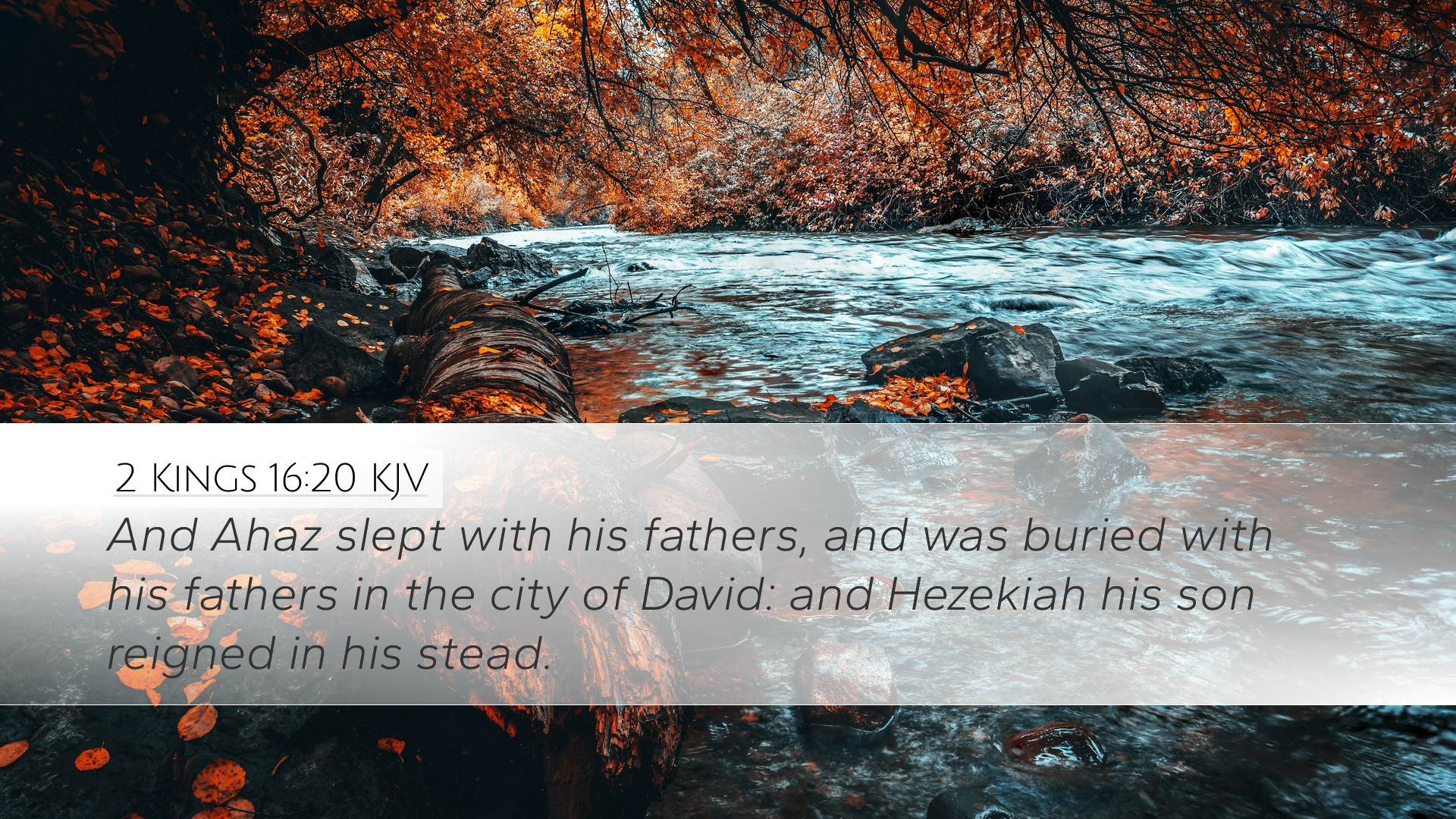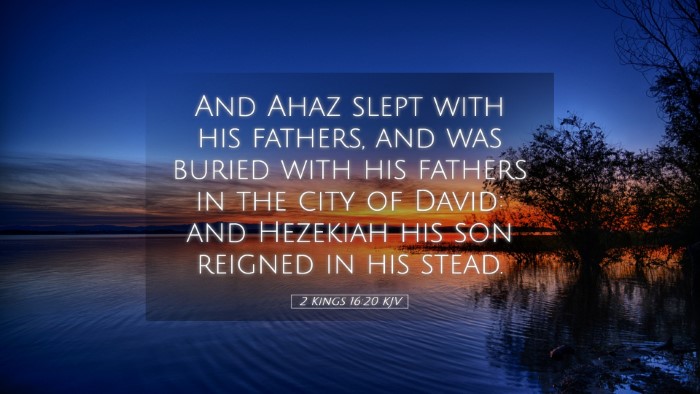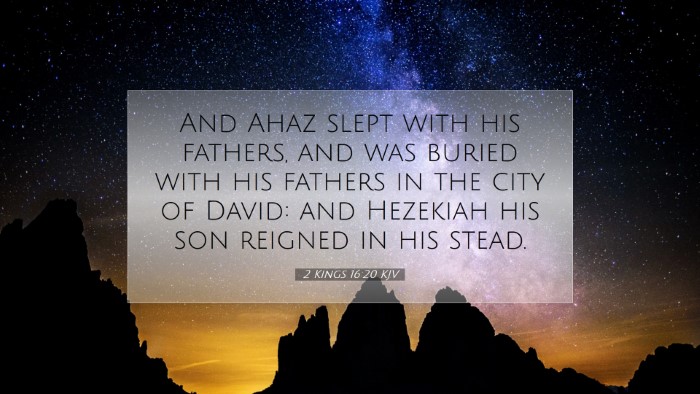Old Testament
Genesis Exodus Leviticus Numbers Deuteronomy Joshua Judges Ruth 1 Samuel 2 Samuel 1 Kings 2 Kings 1 Chronicles 2 Chronicles Ezra Nehemiah Esther Job Psalms Proverbs Ecclesiastes Song of Solomon Isaiah Jeremiah Lamentations Ezekiel Daniel Hosea Joel Amos Obadiah Jonah Micah Nahum Habakkuk Zephaniah Haggai Zechariah Malachi2 Kings 16:20
2 Kings 16:20 KJV
And Ahaz slept with his fathers, and was buried with his fathers in the city of David: and Hezekiah his son reigned in his stead.
2 Kings 16:20 Bible Commentary
Commentary on 2 Kings 16:20
Verse Context: 2 Kings 16:20 states, "So Ahaz slept with his fathers, and was buried with his fathers in the city of David: and Hezekiah his son reigned in his stead." This passage occurs at a significant juncture in the history of Judah, marking the end of Ahaz's controversially reign and the commencement of Hezekiah, a king known for his religious reforms.
Historical Background
The reign of Ahaz is characterized by political alliances, religious apostasy, and moral decline. As a king, Ahaz showed more reliance on Assyria than on faith in God, which resulted in significant consequences for the kingdom. His decisions, particularly those involving the worship practices introduced from pagan nations, brought considerable disturbances to the spiritual life of the people.
Commentary Insights
Matthew Henry's Perspective
Matthew Henry interprets this verse as a conclusion to the troubled reign of Ahaz. He stresses that despite his earthly power and alliances, Ahaz ultimately succumbed to death like all men. His burial in the city of David signifies a respect for his lineage, yet Henry notes the tragedy of his reign—one marked by infidelity and idolatry. Henry concludes that while Ahaz had the opportunity to turn to God, he chose worldly security over divine trust, leading to a heavy burden on the kingdom he left behind.
Albert Barnes' Commentary
Albert Barnes highlights the entrenched corruptions during Ahaz’s reign. His failure to follow the ways of his ancestors resulted in a legacy of sin, which would linger into the reign of Hezekiah. Barnes emphasizes that Hezekiah, as the successor, had the daunting task of restoring faith practices that had been undermined. This transition reveals a divine orchestration where righteous leadership follows periods of moral decay, illustrating the providential guidance of God through human history.
Adam Clarke's Insights
Adam Clarke provides a historical and prophetic lens on the passage. He notes that Ahaz's death was notable not just for its timing but also for its implications—it closed a chapter of rebellion against God and ushered in a new leadership era. Clarke also remarks on the burial arrangements, linking them with the importance of proper recognition for kings in ancient Israel. He asserts the significance of Hezekiah’s reign, which represented a stark contrast to his father's rule, emphasizing a turn back to covenant faithfulness and spiritual renewal.
Theological Reflections
In reflecting on Ahaz's life and reign, there are several theological implications that resonate for contemporary believers:
- The Sovereignty of God: Ahaz's life serves as a reminder that God is ultimately sovereign over kingdoms and rulers. Despite Ahaz’s choices, God’s purposes were fulfilled through the subsequent reign of Hezekiah.
- The Importance of Legacy: How leaders govern has lasting effects. The contrast between Ahaz and Hezekiah highlights the profound implications of faithfulness versus unfaithfulness in leadership roles.
- The Call to Repentance: Hezekiah's reign invites believers to consider the call to return to God, reflecting the constant opportunity for restoration and renewal in faith regardless of previous failures.
- A Warning Against Idolatry: Ahaz's example warns against the allure of worldly alliances and the dangers of compromising faith for political expediency. This call is ever relevant in a culture where distractions can lead believers away from their commitments to God.
Conclusion
2 Kings 16:20 encapsulates a moment of transition, marking not only the death of a king but also a divine opportunity for restoration through Hezekiah’s reign. The insights from Matthew Henry, Albert Barnes, and Adam Clarke collectively draw forth essential lessons about faithful living, the consequences of leadership, and the ongoing narrative of God's faithfulness to His people. Pastors, students, theologians, and scholars alike can glean significant truths from this passage that inform modern Christian living and leadership.


